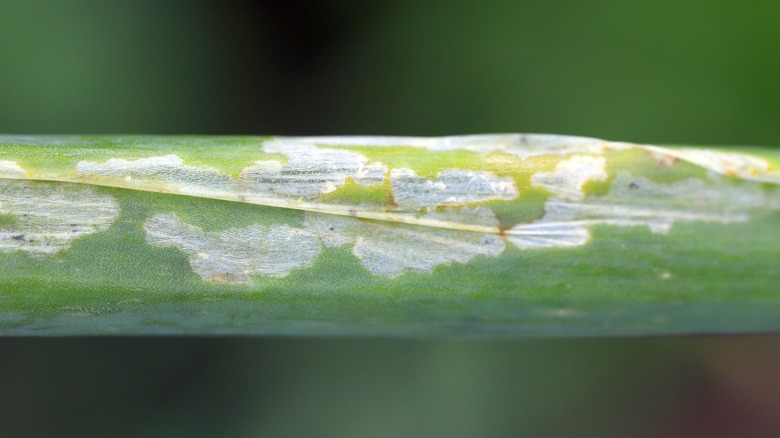Plants can’t give you a verbal signal for when they’re ready to harvest, but many of them have visual signs. Such is the case for garlic. Garlic is a rather finicky plant you don’t want to handle improperly, so getting the timing and method right is an absolute must. Otherwise, you lose out on that garlicky goodness. My Garden Burner on TikTok demonstrates how you can know for sure your garlic is ready to harvest, so you don’t have to take a chance in harvest roulette. The easiest way is to look at the foliage. Garlic leaves are connected to the papery skins underground. When they start to turn yellow, you’ll know the cloves are almost ready, and when they’re brown, you can harvest them.
As with most things in the garden, this harvesting rule has a few caveats. Dry leaves are sometimes an indicator of rotting skins, and garlic can occasionally be ready to harvest when the leaves are still green. It largely depends on the growing conditions, so as long as you keep up with the care of your garlic plants, the leaves will be a trustworthy method of knowing when to harvest.
Look for the signs
♬ original sound – My Garden Burner
Watch on TikTok
Dry leaves are a telling sign that it’s time to harvest garlic, but you need to understand the nuances to know if it’s time. If you’re new to growing your own garlic, grow a few extra cloves so you can test to see if they’re ready and avoid ruining your expected harvest. Garlic leaves will start drying from the bottom and work their way up. Garlic will grow a scape (flower) before the leaves change color. Though it can vary, a scape is usually a sign that harvesting is about a month away. The bottom leaf will turn yellow soon after and fade to brown as it dies, and the leaves above it will follow suit. My Garden Burner advises to harvest when the bottom five leaves are brown.
Garlic hates wet feet, so it’s imperative that you don’t overwater them. Keep them moderately moist as they grow, but stop watering them 1 to 2 weeks before harvesting, which should be about when the fourth leaf starts dying. Allowing the garlic to be too moist will cause a plethora of problems at harvest time. The skins could rot and expose the cloves, making long-term storage impossible. It can also make drying out the garlic more difficult since the skins and cloves will have too much moisture at harvest.
Watch for unique situations

No two gardens are alike, and neither are the gardeners growing them. While one person may wait for five leaves to die before harvesting, someone else may need to harvest when only two die. This is due to all the day-to-day factors that come with growing garlic. Letting your garlic get too dry or wet can cause leaves to die, giving you a false harvesting signal. If your plants suffer from pests and diseases while growing, diseased or chewed-up leaves won’t be reliable. Thrips, for instance, drink sap from leaves and cause them to turn brown. Severe infestations can ruin one or more leaves and make them look ready to harvest. On the flip side, if growing garlic goes well and you’re blessed with a pest and pestilence-free garden, they may be ready to harvest while the leaves are still green. In this situation, waiting for leaves to give the signal will likely result in rotted garlic cloves.
If you’re unsure whether to follow the leaves, think about the journey. Did you have a lot of problems? Did you keep the soil too dry or wet? Did you have enough sunlight and appropriate temperatures? You may not want to go by the leaves if any of these factors are unbalanced. Instead, remove one garlic plant and inspect the cloves. The cloves should be plump enough to fill in the skins. They’re not ready if there’s extra room and the cloves are spherical rather than wedges.